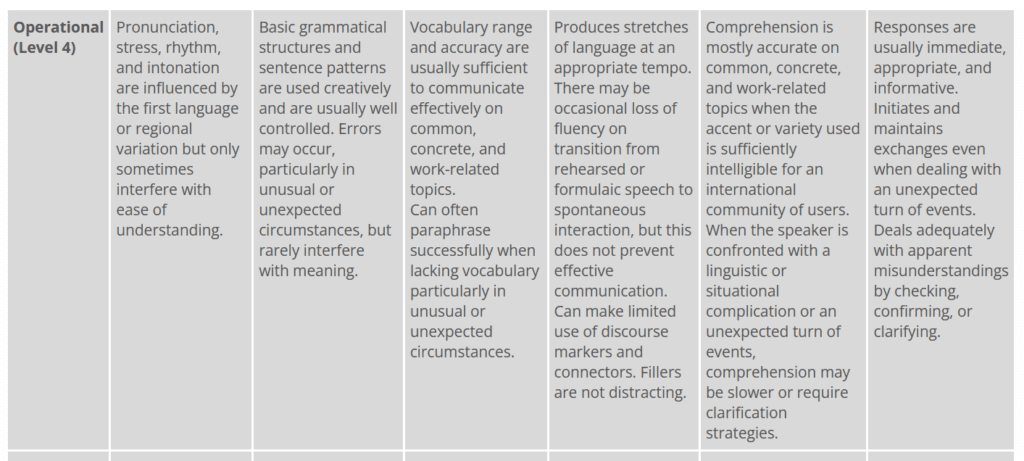English Proficiency: A Gateway to Global Aviation Safety
The world is becoming more connected every day, and the aviation industry is a prime example of this globalisation. Pilots often find themselves communicating with air traffic control and other pilots from different parts of the world. Therefore, English language proficiency (ELP) is crucial for ensuring safety and employability within the international aviation system.
Regulation (EU) 2020/359
According to EASA Part.FCL Regulation (EU) 2020/359, aeroplane, helicopter, powered-lift, and airship pilots required to use the radio telephone shall not exercise the privileges of their licences and ratings unless they have a language proficiency endorsement on their licence. This endorsement must be in either English or the language used for radio communications involved in the flight. The endorsement shall indicate the language, the proficiency level, and the validity date, and it shall be obtained in accordance with a procedure established by a competent authority. The minimum acceptable proficiency level is the operational level (Level 4) in accordance with Appendix 2 to this Annex EASA Document Library.
To assess your English language proficiency, you’ll need to take a test given by an approved examiner or organisation. Unless you’ve already proven your English skills at the expert level (level 6) you’ll need to retake the language proficiency test every:
- 4 years if you scored at the operational level (level 4)
- 6 years if you scored at the extended level (level 5)

The Importance of English Language Proficiency
The European Union Aviation Safety Agency (EASA) has established a task force to standardise the approach to the assessment of language proficiency by sharing and promoting best practices. This initiative also aims to promote the early use of English in the delivery of training for future airline pilots. The earlier a pilot starts using English every day, the better the safety standards will be, and the more employable they will be within the international aviation system EASA Pilot Training Paradigm.
EASA defines a proficient speaker as follows:
Proficient speakers shall:
- communicate effectively in voice-only and in face-to-face situations;
- communicate on common and work-related topics with accuracy and clarity;
- use appropriate communicative strategies to exchange messages and to recognise and resolve misunderstandings in a general or work-related context;
- handle successfully the linguistic challenges presented by a complication or unexpected turn of events which occurs within the context of a routine work situation or communicative task with which they are otherwise familiar; and
- use a dialect or accent which is intelligible to the aeronautical community.
In addition for holders of an instrument rating, they must be able to use the English language for the following purposes:
- flight: R/T relevant to all phases of flight, including emergency situations.
- ground: all information relevant to the accomplishment of a flight:
- be able to read and demonstrate an understanding of technical manuals written in English, for example an operations manual, a helicopter flight manual, etc.;
- pre-flight planning, weather information collection, NOTAMs, ATC flight plan, etc.;
- use of all aeronautical en-route, departure and approach charts and associated documents written in English.
- communication: be able to communicate with other crew members in English during all phases of flight, including flight preparation.
Conclusion
English language proficiency is a critical requirement for pilots, and its importance cannot be overstated. It is essential for ensuring safety, as communication is a key component of aviation operations. Pilots must be able to understand and respond to instructions accurately and quickly. Additionally, English language proficiency increases a pilot’s employability within the international aviation system, as English is the global language of aviation. Therefore, aspiring pilots should prioritise developing their English language skills as early as possible in their training journey.
Skypilot Academy introduces English language learning right from the start with the help of Padpilot e-books. Moreover, we have a dedicated English language tutor on staff who offers students training for their ELP test. The ELP test can be taken either in combination with the License Skill Test or separately. If you need more information about English language training, you can get in touch with Eric directly. He would be pleased to assist you. Use the contact form to send your message.
- Mastering Air Law: Essential Knowledge for Your Private Pilot Licence
- A Guide to Theoretical Knowledge for the Private Pilot Licence
- EASA Private Pilot Licence (PPL): A Guide to Training Requirements and Costs
- How to Become a Professional Pilot in Europe: A Comprehensive Guide
- Pilot shortage in Europe: What you need to know